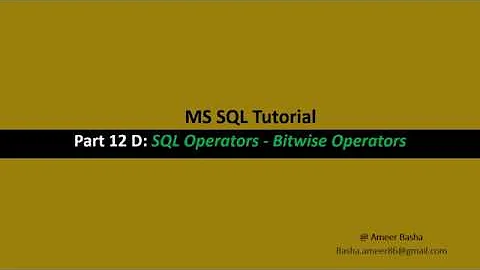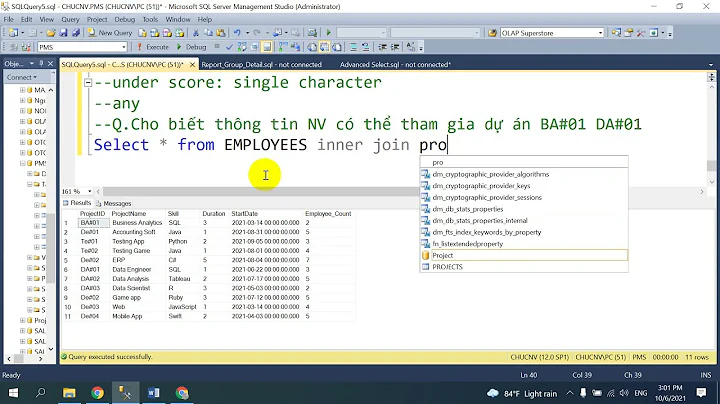Is there an exclusive OR operator in T-SQL?
27,453
Solution 1
Not very succinct, but you could expand out the logic like this:
WHERE
(NOT ((@UserName IS NOT NULL) AND (@EditorKey IS NOT NULL))) AND
((@UserName IS NOT NULL) OR (@EditorKey IS NOT NULL))
Or use the bitwise XOR operator (^):
WHERE
(CASE WHEN (@UserName IS NOT NULL) THEN 1 ELSE 0 END) ^
(CASE WHEN (@EditorKey IS NOT NULL) THEN 1 ELSE 0 END) = 1
You can use a similar approach where there are three or four parameters, and exactly one must have a value:
WHERE
(CASE WHEN (@Var1 IS NOT NULL) THEN 1 ELSE 0 END) +
(CASE WHEN (@Var2 IS NOT NULL) THEN 1 ELSE 0 END) +
(CASE WHEN (@Var3 IS NOT NULL) THEN 1 ELSE 0 END) +
(CASE WHEN (@Var4 IS NOT NULL) THEN 1 ELSE 0 END) = 1
Solution 2
As a cheat, you can do:
If @UserName+@EditorKey is null and coalesce(@UserName,@EditorKey) is not null
It's shorter, but that may be the only thing it has going for it.
Related videos on Youtube
Comments
-
 Jonathan Allen about 2 years
Jonathan Allen about 2 yearsThis is my statement
IF (@UserName IS NULL AND @EditorKey IS NULL) OR (@UserName IS NOT NULL AND @EditorKey IS NOT NULL) BEGIN RAISERROR ('One of @UserName, @EditorKey must be non-null.', 15, 0) RETURN ENDWhat I want is to be able to do something like this:
IF (@UserName IS NOT NULL) XOR (@EditorKey IS NOT NULL) BEGIN RAISERROR ('One of @UserName, @EditorKey must be non-null.', 15, 0) RETURN ENDFor two parameters it isn't that big of a deal, but some procs have three or four where in only one may be passed and the rest should be null.
-
 Andriy M about 13 yearsYour first statement,
Andriy M about 13 yearsYour first statement,(a AND b) OR (NOT a AND NOT b), is a replacement fora EQU b(logical equivalence), which is logically the negation ofXOR. The latter is represented, for example, like this:(a AND NOT b) OR (NOT a AND b)or like this:(a OR b) AND (NOT a OR NOT b). -
 BuZZ-dEE about 10 yearspossible duplicate of T-SQL XOR Operator
BuZZ-dEE about 10 yearspossible duplicate of T-SQL XOR Operator
-
-
 Andriy M about 13 yearsThe first half of the expression is essentially
Andriy M about 13 yearsThe first half of the expression is essentially((@UserName IS NULL) OR (@EditorKey IS NULL)), according to De Morgan's laws. -
Chris Fulstow about 13 years@Andriy Agreed, I'm treating
(@UserName IS NOT NULL)as a general case boolean expression without simplifying any of the logic. -
 Jonathan Allen about 13 yearsIt isn't pretty, but at least it will scale.
Jonathan Allen about 13 yearsIt isn't pretty, but at least it will scale. -
Chris Fulstow about 13 yearsIt's slightly unsatisfying if there isn't a better way to do it. The main limitation seems to be the lack of a proper bool data type in TSQL.
-
Ben Mosher about 12 yearsLove it. To morph this into true XOR,
((logical condition) <> (other logical condition)). -
shannon about 11 yearsCorrect me if I'm wrong, but you the SQL server Boolean data type is not comparable? "IF (NULL IS NULL) = (NULL IS NULL) PRINT 'COMPARABLE'" yields "Incorrect syntax near '='"
-
Denis de Bernardy about 11 years@shannon: Shouldn't you be wrapping that print in between begin/end?
-
shannon about 11 years@Denis: It's surely better form but not necessary for single operations. The result is the same. Can you give it a try and tell me if I'm wrong? I'm writing similar constraints at this very moment. Would love to use this technique and upvote you.
-
Denis de Bernardy about 11 yearsTbh, I merely translated what I do Postgres, where it works just fine... I occasionally use the construct in check constraints to make fields mutually exclusive.
![[SQL Server] #09 - Lập trình T-SQL](https://i.ytimg.com/vi/kCc9wUwfq6s/hq720.jpg?sqp=-oaymwEcCNAFEJQDSFXyq4qpAw4IARUAAIhCGAFwAcABBg==&rs=AOn4CLDVMSJDZkxWJuDrydGGsBnNinejqg)


![Querying Microsoft SQL Server (T-SQL) | Udemy Instructor, Phillip Burton [bestseller]](https://i.ytimg.com/vi/PaNpV-15_YY/hq720.jpg?sqp=-oaymwEcCNAFEJQDSFXyq4qpAw4IARUAAIhCGAFwAcABBg==&rs=AOn4CLAnz8Cra__HVYKnxTyyoD4xyagwkw)







